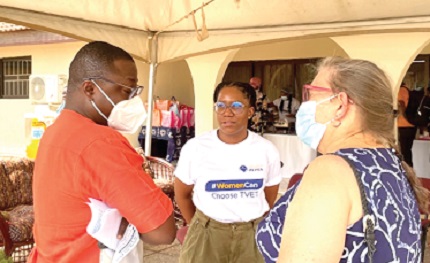Ghana News | Ghana Elections | Breaking News in Ghana

Bridging gender gap in skills development:CTVET launches campaign for women
The drive to encourage more women into the male-dominated Technical and Vocational Education and Training (TVET) trades has become a topical issue in the country.
It follows recent efforts injected into TVET by the government and other relevant stakeholders with the aim of producing skilled youth who will be ready for the job market.
Unfortunately, there is a significant gender gap in the area of TVET, as it is mainly dominated by males.
There is a high demand for skilled labour, yet many young women are not attracted to these sectors.
This is because there is a lack of information on the real employment and income-earning opportunities available, as well as wrong perceptions about the sector.
Perceptions such as dirty, dangerous, demanding and only for school dropouts contribute to a reduced number of women moving into TVET.
Launch of “INVEST in Her”
It is in recognition of this that the World University Service of Canada (WUSC), in partnership with the Commission for Technical and Vocational Education and Training (CTVET), on Friday, February 18 launched a campaign to encourage women to pursue careers in male-dominated TVET trades.
The campaign, dubbed “INVEST in Her”, is aimed at changing deep-rooted perceptions and norms about women’s involvement in these trades.
The campaign is part of the Innovation in Non-Traditional Vocational Education and Skills Training (INVEST) project for women in the country.
It is a five-year initiative (2020-2025) that will reach 5,000 urban poor young women in Accra, Kumasi and Takoradi, Ghana.
Inclusive market systems
Using an Inclusive Market Systems (IMS) approach, the project will INVEST in women, institutions and the labour market system of high-growth sectors to achieve transformative change that is sustainable and scalable.
This entails examining and acting upon the root causes of gender and social norms that negatively affect women’s economic empowerment; addressing labour market constraints within the Ghanaian society that intensify these negative impacts and engaging a wide array of stakeholders on both the supply and demand sides of the labour market.
Changing the narrative
The Project Director of INVEST, Ms Appiah Boakye, said the INVEST in Her campaign was a major driver that sought to change the narrative by eliciting support from all stakeholders towards empowering women to take up jobs in male-dominated sectors.
“We believe that investing in women in these trade areas will help contribute to higher employment, better livelihoods and increased contribution to the economy of Ghana.
“We have several initiatives under this campaign to achieve the desired outcomes. This includes radio drama series on some radio stations, TV campaign, community outreaches and stakeholder engagements, and some capacity-building sessions,” she said.
She stated that through the INVEST initiative, WUSC was utilising an IMS approach to strengthen the capacity of a diverse array of TVET stakeholders to support women trainees, graduates, artisans and entrepreneurs in male-dominated trades.
Unique opportunity
The Country Director of WUSC Ghana, Emelia Asamoah, indicated that the project would further provide a unique opportunity to strengthen and connect TVET system actors on both the supply and demand side of the labour market.
According to her, the INVEST in Her campaign would amplify those efforts and connect a wider audience to the message of change.
“Leveraging on partner expertise, WUSC is working with the CTVET, ABANTU for Development, National Entrepreneurship and Innovation Plan (NEIP), Ghana Chamber of Construction and Industry, Women in Law and Development, Self-Search Ghana, Ghana TVET Service, Lyme Haus Solutions, Farm Radio international and other partners.
“With diverse initiatives, the partners will improve the capacity of system actors within the TVET system to deliver market-relevant and gender-sensitive training and support services to young women in Kumasi, Sekondi-Takoradi and Accra,” she said.
Political will
The acting Director-General of CTVET, Dr Fred Kyei Asamoah, observed that there was strong political commitment from the government to change the narrative through TVET.
“The beauty of what we are doing today is that there is a political will in this country to change the narrative. Gone are the days when you would hardly hear what the government was doing to bring change in the country,” he said.
According to him, there was the need for stakeholders to empower young women into the male-dominated technical and vocational education and training trades.
“Women have special brains to multitask compared with their male counterparts who can only focus on one thing at a time.
“And so, the government is using a more conclusive approach to encourage more people into the TVET space,” he added.


